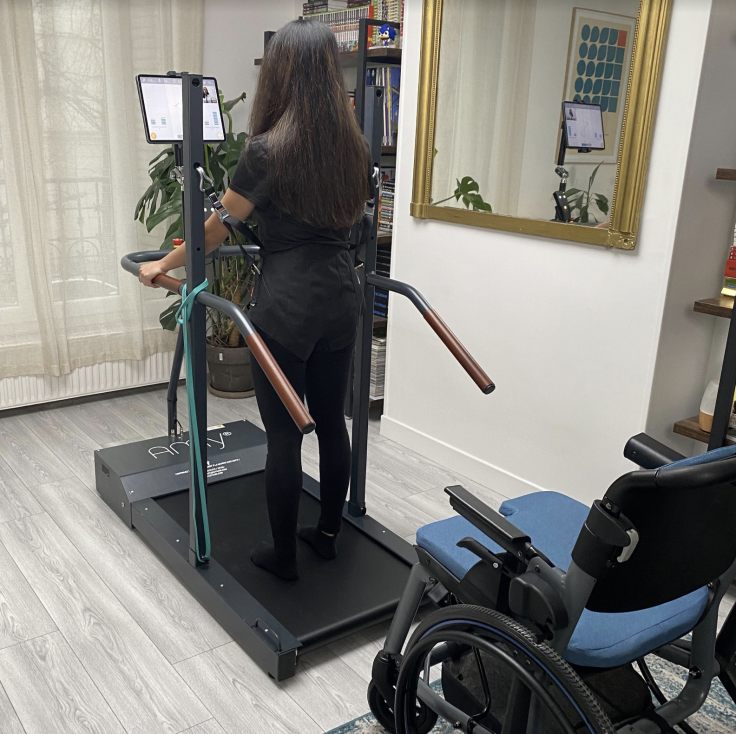Innovating Healthcare: EzyGain Redefines Rehabilitation with Cutting-Edge Software

EzyGain, a pioneering company in rehabilitation solutions, offers groundbreaking rehabilitation equipment, training, and coaching for individuals recovering from various conditions ranging from neurology, pediatrics, and orthopedics. Its software serves as the backbone of its offerings, as it seamlessly integrates with the company's hardware medical devices.
The company was established in 2016 by a team of engineers, entrepreneurs, and medical professionals. CEO Zineb Agoumi, COO Thibault Faÿ, CTO Jean-Baptiste Martin, Dr. Thierry Albert, and lead designer Félix Botella envisioned revolutionizing rehabilitation by making it more accessible and effective through technology. "We recognized that there's a need for compact, affordable, and smart rehabilitation devices. We made it our mission to create solutions that could gather and present data in a meaningful way to patients and physiotherapists to fill this gap," the COO shares.
They turned this vision into reality by developing their flagship products, amy®, ema®, and a Virtual Reality (VR) kit. Amy®, an all-in-one treadmill, provides safe rehabilitation at home with features tailored for conditions such as stroke, cerebral palsy, multiple sclerosis, and Parkinson's. Similarly, ema® offers verticalization and weight training in a compact design. Meanwhile, the VR kit can be used as a stand-alone device or can be synchronized with any treadmill.
It's worth emphasizing, however, that besides its groundbreaking products, EzyGain stands out for its approach to software development. EzyGains' state-of-the-art software guarantees continuity of care, facilitating a smooth transition from different care settings (e.g., physicians' offices, nursing homes, rehabilitation centers, etc.) to homes. It has two main components: a global app that interfaces with multiple hardware devices, both internal and external, and the virtual reality (VR) module for immersive rehabilitation experiences.
Its advanced features, such as telerehabilitation (live video rehab) and real-time biofeedback, allow therapists to monitor and guide patients through their sessions remotely. This augmented approach allows EzyGain to enhance patient experience and streamline communication between patients, therapists, and caregivers, leading to more effective rehabilitation outcomes.
Besides the technological continuum, EzyGain's software stands out for its openness to integration with partner devices. It connects not only to hardware developed in-house but also to devices from other manufacturers. This interoperability opens possibilities for rehabilitation programs tailored to individual needs, showcasing the company's commitment to innovation and collaboration within the healthcare ecosystem.
"The goal is to make rehabilitation an engaging and immersive experience. Our team created narratives and designed landscapes in our VR offerings so everyone who uses it looks forward to their rehabilitation sessions," Faÿ states. Reflecting on the challenges they encountered, he adds, "Of course, we always had to keep the users' needs in mind. Since we have a wide user demographic, from children with cerebral palsy to elderly stroke survivors, the challenge was to cater to their needs while maintaining this common thread of motivation."
To address this pain point, EzyGain prioritized product design and development. The feedback the team receives from users demonstrates the success of this approach. Users consistently praise the software for its ease of use and intuitiveness. They also note the software's motivational factor, as it resonates with users and drives them to actively participate in their rehabilitation journeys and achieve their goals.
EzyGain's innovative approach to rehabilitation technology has reshaped the landscape of patient care. It has made it more accessible, engaging, and effective. It has achieved remarkable success in fulfilling its mission of helping individuals take control of their recovery journeys by combining cutting-edge hardware with immersive software to create a continuum of care that extends from hospitals to homes.
With this, the company is set for further expansion and impact. After establishing a presence across Europe and beyond, including countries like France, Belgium, Switzerland, Germany, the UK, Morocco, Ukraine, Thailand, Taiwan, and Hong Kong, they're now eyeing the US market. They recently launched the first units of their flagship products in New York City, aiming to bring innovative solutions to even more individuals needing rehabilitation support.
© Copyright IBTimes 2024. All rights reserved.











